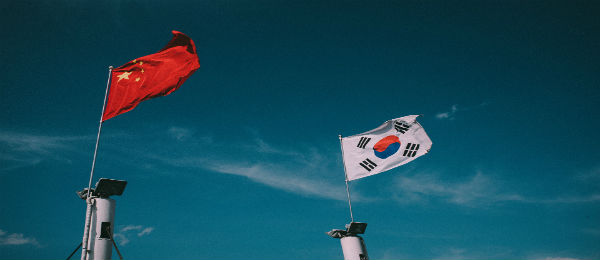The ‘powers’ of Northeast Asia are Korea, China, and Japan. Since the year dot, the three countries have had economic and cultural relations. However, since some historical issues and diplomatic matters have become significantly problematic, it has been impossible to avoid unfavourable and, sometimes, hostile sentiments among the three nations. Recently, a few unwelcome incidents regarding Koreans have unfortunately occurred. Some of these situations seem to be due to ill-intent against Koreans, and some have even gone as far as describing it as an "anti-Korean movement". What has happened, and what has caused this anti-Korean sentiment?
Anti-Korean Movements
 |
In Japan
· Hate Speech
With the increase of anti-Korean sentiment in Japan, the total number of the hate speeches in that country, against Korea, from April 2012 to the end of 2015, reached more than 1100. These hate speeches include insulting expressions like "get out of Japan", "kill all Koreans", and " Koreans are roaches". Since then, in January 2016, an investigation by a UN special rapporteur regarding the anti-Korean discrimination happening in Japan called for the Japanese government to regulate hate speech by law. Although the Japanese parliament finally banned hate speech against Koreans and other foreigners in May 2016, the bill does not stipulate any punishment for violators, raising questions over its effectiveness.
· Wasabi Terror
In October 2016, wasabi, the Japanese green paste often eaten with sushi and sashimi, came to be at the centre of an Korea-Japan relations issue. A well-known Japanese sushi restaurant in Osaka was accused of intentionally putting too much wasabi with their sushi for some Korean customers. There were also many complaints on the Internet about excessive wasabi being served with sushi in that particular restaurant. Additionally, the fact that the chefs in the restaurant made some anti-Korean remarks in front of the Korean visitors caused quite a stir. As the controversy grew, the restaurant posted a letter on its website in relation to the so-called ‘wasabi terror’. But, some pointed out that the letter is not an apology, but merely an attempt at excusing their actions. Since Osaka is one of the most popular tourist destinations in Japan, averaging 4000 Korean visitors a day, and is home to the greatest number of Korean residents in the whole country, the issue is one which has caused much tension.

In China
· Movement to Sanction South Korean Content on TV
In August 2016, the State Administration of Radio, Film and Television (SARFT), which is a China’s broadcasting regulator, appeared to confirmed that it would apply more strict criteria to the screening of Korean content, and even ban some Korean shows from its television screens. The sanction reported by SARFT also includes banning some Korean idols and stopping additional investment in the Korean cultural industry. Even a famous Korean drama fan convention, originally planned to be held in China, has been cancelled. Its unexpected sanctions were in response to the Korean government’s decision to deploy the Terminal High Altitude Area Defense (THAAD) system, despite the Chinese government's opposition to it. This regulation against the so-called ‘Korean cultural wave’ is seen as an attempt to undermine sentiments of friendship and cooperation between the two countries. Moreover, China’s state-controlled media has stirred up further anti-Korean sentiment among the public, reporting the potential cessation of economic cooperation and interaction between China and Korea.
What Caused These Countries to Develop Anti-Korea Sentiment?
In Japan
· Led by Right-Wing Nationalists
In its early days, sentiment against Korea originated from Japanese right-wing groups. However, it has gradually spread via the internet, and has affected wider Japanese society. According to a survey conducted by the Japanese Ministry of Foreign Affairs in November 2015, it was revealed that 60% of Japanese have feelings of animosity towards Korea. As many Koreas also have feelings of animosity towards Japan, particularly in relation to the period of Japanese imperialism, it is regrettably true that these deep-rooted sentiments between the two nations seem inescapable. Though some of the tension was eased for a while as the ‘Korean wave’ of popular culture exerted influence in Japan, former President Lee Myung Bak’s visit to Dokdo in August 2012 triggered a new diplomatic row between the countries which reignited anti-Korean sentiment.
· Registration of Korean Comfort Women on the Memory of the World Register
Amid tension between Japan and Korea, greater animosity towards Korea flared up again in May 2016 when an international committee submitted an application to UNESCO’s Memory of the World Register, listing 2,744 documents and records about Korean victims of Japan's sexual slavery. The committee comprised 14 civic groups from 8 countries, including South Korea, China, and the Netherlands, for the purpose of honouring the victims of Japan's sexual slavery. The final decision as to whether these records will be accepted as part of UNESCO’s Memory of the World Register will be announced in October 2017. The Japanese government has declared that it wishes to prevent these documents from becoming registered on the list, with some of right-wing parties opposing the documents even more vehemently. Additionally, in September 2016, an incident occurred where a threatening letter was sent to the Museum of Japanese Military Sexual Slavery in Tokyo. The letter is yet further evidence of Japan’s right-wing nationalists refusing to accept Japan's sexual slavery as a serious war crime.
In China
· Different Historical Views between Korea and China
According to a survey of 6800 Chinese internet users conducted by the Chinese media, 49.9% of respondents answered that “Koreans hold distorted historical views.” In addition, many were also of the view that "Korea belongs to the Chinese cultural sphere, though Koreans distort their historical origins in order to present a history that is somehow completely separate from Chinese culture.” Such nationalistic Chinese views tend to assert that China is a suzerain, emphasising the national greatness of the China in terms of cultural, historical, and political matters. Nationalism in China has risen significantly as China's economy has developed and the country’s international influence has increased. It is rarely possible to avoid these arguments between Korea and China concerning historical and cultural issues.
 |
· Discrimination by Koreans
The second highest answer to the question asking about the causes of negative attitudes towards Korea, meanwhile, was “Koreans have improper attitudes toward Chinese people”, accounting for 24% of responses. In February 2016, investigations by the Korean police during the 14-day Chinese New Year holiday revealed 414 illegal sales or business transactions in which the victims were foreigners, with the majority of these being Chinese tourists. This figure amounts to roughly three times more than the previous year. Some Chinese tourists, for example, complained of being ripped off by local cab drivers. There was even a case where a street vendor had sold "gimbap" to a Chinese tourist for about five times the regular price. Such scenarios regarding Koreans' ‘evil deeds’ have spread via Chinese SNS quickly, further contributing to anti-Korean sentiment.
Efforts to Resolve Anti-Korean Sentiment
The negative sentiments in Japan and China towards Korea are in fact only part of an irrational emotional response. There are of course also positive perceptions of Korea, and, of course, Korean have hostility towards China and Japan is equally irrational and unacceptable. At this very moment, however, it is difficult to improve international relations among the three countries without more concerted efforts from each nation.
 |
Historical Concord "Peace Forum for Korea-Japan-China"
In October 2016, there was a peace forum held in Busan, which included historians from Korea, Japan, and China. This forum was to stress the importance of upright history education, seek solutions for future peace, and discuss the role of civil society for future generations. Above all things, in terms of relations between the three countries, it was agreed that the conflicts regarding history need to be resolved as a matter of urgency. The very fact that the forum had aimed for mutual concord, not unilateral approaches, is of undoubted significance.
Friendly Cooperation "Chopstick Festival"
In November 2016, there was a chopstick festival held in Cheongju city. Festivals such as this can help to highlight some common cultural traits between Korea, Japan, and China; in this case, that trait was in the form of chopsticks! It is important to celebrate those things which the three nations have in common, including tea and food cultures, in order to help eradicate hostile sentiments.
Exchange of Future Human Resources "Campus-Asia Programme"
Since 2016, the governments of Korea, China, and Japan have established the Campus-Asia Programme, which has led to better cooperation and collaboration among the three East Asian countries. Since the programme was adopted as a new government project at the third summit conference between the countries in 2010, it had been conducted as a test operation from 2011 to 2015. During the test operation, there have been more than 1900 students who participated in the exchange student programme. The programme received such high praise at a ministerial conference between the three nations that it has been converted to a regular programme until 2021. Students who were part of the test operation said that they acquired much cultural knowledge during their educational exchanges. The programme seems to be valuable in the sense that it could significantly contribute to the harmony between Korea, China, and Japan in future.
 |
Although anti-Korean sentiment is not representative of how all people think of Korea, we need to consider what is important for the continual improvement of Korea’s image and the relations between Korea, Japan, and China. We might also reflect on the sentiments we have toward other countries, are the reasons for these sentiments, and how we might resolve any negative sentiments for the sake of creating a more harmonious world.
이준 junei95@naver.com
<저작권자 © 인하프레스, 무단 전재 및 재배포 금지>

![[보도] 제43대 총학생회 후보자 공청회 개최돼](/news/photo/202404/11686_5015_2626.png) [보도] 제43대 총학생회 후보자 공청회 개최돼
[보도] 제43대 총학생회 후보자 공청회 개최돼
![[보도] 제43대 총학생회 후보자 공청회 개최돼](/news/thumbnail/202404/11686_5015_2626_v150.jpg)
![[보도] 총학생회장 선거 열려···학생사회 대표자는?](/news/thumbnail/202403/11668_5014_266_v150.jpg)
![[보도] 무전공·계열제 논의···학생은 어디에?](/news/thumbnail/202403/11666_5011_2238_v150.jpg)
![[보도] 인하 70돌, 다양한 행사 이어져](/news/thumbnail/202403/11663_5009_165_v150.jpg)
